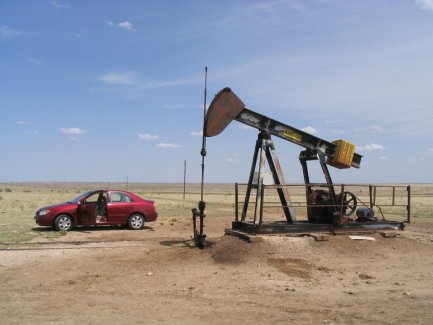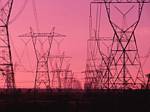Roger J. Wendell
Defending 3.8 Billion Years of Organic EvolutionSM


 My car near Dalhart, Texas... |
Fossil Fuels and Peak Oil |

|
|
Do you really believe the price of oil will go down if our population continues to increase?
- Roger J. Wendell, September 2007 |

|
Click Here for my page on Climate Change and Global Warming... |

|
Click Here for my page on why we should be riding more bicycles! |

|
Click Here for my page on boiling nukes..." |
Fracking: Delaying the Inevitable
Depending on the maturity level of the organic material and its makeup there are some shales that are gas makers and others that are oil. Some make oil now, but would make gas in another 50,000-100,000 years perhaps. Gas gets through those pore throats more easily so shale gas wells should be longer lived than oil.
Peak oil was based on the technology employed at the time it was postulated. It took into account the idea of a limited resource of conventional reservoirs. Shale reservoirs have altered that equation significantly. It's not only fracking however. It's also horizontal well technology. We can get to more of the rock at a single level and produce more efficiently from a horizontal well than drilling a bunch of vertical wells. We also place the wells at one or two points on the surface per square mile rather than sixteen so not so many holes dotting the landscape. The resource still has a limit, but I think the peak has been moved out some number of years. The only other way to get the oil and gas out of shales is to mine it. There are surface shale deposits that are mined and crushed and retorted to release the oil and gas. Also oil sands that are mined (Canada has some huge oil/tar sand mines). Without fracking and horizontal drilling it's not possible to get economic amounts of oil and gas out of the shale.
In the nineties we were trying to get to 30 years of reserve life for Rockies reservoirs. Today, because of shale gas and oil we see just the Marcellous shale play in Pennsylvania has created about 200 years of US demand natural gas. Shale gas has pretty much allowed the Obama administration to significantly cripple the coal industry. Natural gas fired power is much more efficient and a whole bunch cleaner. Although we will never completely run out of oil, gas (or coal) the fact remains that hydrocarbons will become increasingly more expensive to extract - eventually reaching a point where it's no longer economically viable to pursue them.

The Economist
The Americas, December 22, 2007, p. 55

|
"Cantarell, in the Gulf of Mexico, was once the world's biggest offshore oilfield, holding over 35 billion barrels of the black stuff. Now, after nearly three decades, it is running out. At its peak in 2004 it produced 2.1m barrels of oil per day (b/d), making up 60% of Mexico's total output. That figure has already fallen by more than 500,000 b/d and could fall by another 200,000 b/d by the spring."
"This is a worry for both Mexico and the world. Although Mexico contains less than 1% of the world's proven oil reserves, it is the sixth-largest producer. Its output of 3.1m b/d is well above that of Venezuela or Kuwait. And although oil no longer dominates the Mexican economy - even at recent high prices it provided 16% of exports in 2006, down from 68% in 1982 - it lubricates the public finances, contributing nearly 40% of federal revenues." |

More fun quotes:
"In Sweden we have strawberry fields where you can go out and pick for yourself. If you go out there in the morning there is a possibility that you can pick a big volume of strawberries. But the first picker picks the big ones. The last one is left with the small ones. It's very much the same thing when it comes to the production of gas and oil."- Kjell Aleklett, Swedish Professor of Physics
"Aleklett believes the peak could arrive as soon as 2008 -- and that the struggle to adjust to the new energy reality could take 20 years, posing enormous challenges for developed nations. Some observers suggest that the decline will prompt an economic and social meltdown on a scale last experienced in the Great Depression -- or perhaps when the Black Death swept across Europe in 1347. Even the International Energy Agency, which mulls global oil issues on behalf of Canada and 25 other developed countries including the United States, Great Britain and Japan, is exploring 'barbarization' scenarios in which billions of people starve, national governments collapse, economies are forced to deindustrialize, and many regions of the world return to 'semi-tribal or feudal social structures.'"
- From the article, Get ready for oil supplies to dwindle, experts warn
by Scott Simpson, The Vancouver Sun, Sunday, March 04, 2007
"Evidence now conclusively shows that Saudi Arabia's oil production was down 8 percent in 2006 over 2005, even while the number of oil rigs went up substantially -- indicating that the Kingdom is drilling as fast as it can and still losing ground. (Production slipped from 9.9 million-barrels-a-day to about 8.4 mm/b/d.) Mexico's Cantarell field is crashing (minimum 15 percent annual decline and possibly much steeper rate, meaning in a year or two the US will cease getting oil imports from its number two foreign supplier). The North Sea is crashing, too. Russia is about to show steep decline. Iran is past peak. Iraq, as every six-year-old knows, is the world's clusterfuck poster child. Indonesia (OPEC member) is now a net oil importer. Venezuela is past peak and full of loathing for the US. Nigeria is collapsing politically. No amount of corn is going save the Happy Motoring utopia, and that's really all our economy is now based on."
- Jim Kunstler
Singing the Vegetable Opera - March 5, 2007

Although I started thinking about Peak Oil in the early 70s, when I was living first-hand the Arab oil embargo, I didn't start this page until July 18, 2004 (a Sunday evening) while watching CBS news (this was at somebody else's house since we have no TV receiption in our foothills neighborhood...). During the broadcast Texas oilman T. Boone Pickens (founder of the independent oil firm Mesa Petroleum) stated quite clearly that the era of cheap oil was over.This, to me, was such a compelling situation that I searched around for a willing expert to appear on my radio show. As luck would have it, Paul Roberts, author of The End of Oil (On the Edge of a Perilous New World) agreed to appear on August 13th (2004).
- Roger J. Wendell, summer '04

|
Click Here for info on fuel economy..." |

A few months later I read this in the November 8th, 2004 edition of The Nation:

In 1956 Dr. M. King Hubbert, a geophysicist, predicted US oil production would peak
in 1970 - he was right! Other scientists, using Dr. Hubbert's methods, have predicted
a peak in world oil production occurring before 2010. Here are a couple of quotes from
the website named after Dr. Hubbert (The Hubbert Peak Web Page):

History:

"In India, rural China, and Bangladesh, in large parts of Southeas Asia, Latin America, and the Caribean, and in most of Africa, 2.5 billion people still rely on wood, dried animal manure or other so-called biomass for nearly every calorie of energy used for cooking, heating, or lighting. Another 500 million people burn coal - not in furnaces, but in cooking fires and braziers - produccing poor-quality heat and constant clouds of asphyxiating soot. In all, some 3 billion people - roughly half the world's population - rely on enery systems that fail to meet even the most basic human needs."
- Paul Roberts in his book, The End of Oil p. 241


|
Did You Know?
|

How do we prepare?
Although reaching the peak in world oil production is an inevitability, there's a lot that
can be done to lessen the impact on us, as individuals, and on the world environment as well:

Ten Oil Supply Basics (Vis-a-Vis Peak Oil and Sudden Shortage)
by Jan Lundberg

(Jan Lundberg is founder of www.CultureChange.org and
has appeared on my Connections radio program - I've
posted this article, on my site, with Jan's permission)
"The end of abundant, affordable oil is in sight, and the implications are colossal. About now in our hydrocarbon phase of human history, we have pulled out of the Earth approximately half of the available petroleum (crude oil and natural gas). The other half still in the ground is harder to extract and may not -- as assumed -- fuel the global economy or even provide a transition to another phase."

Click Here for the rest of Jan Lundberg's Ten Oil Supply Basics
The Most Important Thing You Don't Know About "Peak Oil"
(Posted on my site with permission from Steven Lagavulin)
"When nothing happens for a long time, people begin to assume that
nothing /ever/ happens. But, sooner or later, something always
happens." - Steven Lagavulin

|
Click Here for the rest of Steve Lagavulin's piece on Peak Oil... |


|
Hydrogen Fuel Folly:
Although I'd love to see some success with Hydrogen fuel cells I'm really skeptical and believe there are some huge problems with it: - Roger J. Wendell |
"Hydrogen is not a new energy source, but rather an energy carrier - like water in a hydronic heating system or electrons in a copper wire. And this energy has to come from somewhere. In a sustainable energy future, hydrogen will be produced mainly by the electrolysis of water. But to carry the energy equivalent of 1 gallon (3.8 l) of gasoline, 2.4 gallons (9 l) of water are needed to yield 2.2 pounds (1 kg) of hydrogen. To satisfy all present transportation energy needs of the city of Los Angeles with hydrogen would double the water consumption rate of the city and require the continuous output of the equivalent of about 100 nuclear power plants." p. 82
"Hydrogen is not a good energy carrier, mainly as a result of its unique physical properties of being the lightest of all elements and having an extremely low boiling point. Because of it low density, it must be compressed or liquefied for transport. Both of these processes require energy. Compression requires about 10 percent of hydrogen's energy content; liquefaction consumes about 30 to 40 percent. Twenty-two tube trailers loaded with hydrogen at 3,500 psi would be needed to match the energy contained in a single gasoline tanker truck." p. 83
"The pseudo-fuel hydrogen will be considered on higher orders of unreality. The so-called 'hydrogen economy' centered around hydrogen-powered cars, as promised by President Bush in his 2003 State of the Union message, is at this point a fantasy, and an especially dangerous one insofar as it promotes complacency about the predicament we face. If there is ever going to be a hydrogen economy, then we are not going to segue seamlessly into it when the fossil fuel economy begins to wobble. At best, the world is going to suffer an interval of economic chaos and social stress between the end of the fossil fuel age and whatever comes next. The question is how long this interval will last: ten years, a hundred years, a thousand years, or forever."
- James Howard Kunstler
The Long Emergency Surviving the End of Oil, Climate Change, and
Other Converging Catastrophes of the Twenty-First Century pp. 100-101
"Using a hydrogen fuel cell as a source of electricity for Field Day is hardly a 100% "green" operation ["A Green Field Day," QST June 2009, pages 70-71]. While it is true that the chemical combination of the hydrogen with oxygen produces only water, I am surprised that the writers of this article didn't pause to consider where the hydrogen comes from.
"We have no chemically uncombined hydrogen available for our use. Rather, it must be obtained from the decomposition of hydrogen compounds; one source is hydrocarbon fuels, but we are trying to minimize their use. The only other source is from the electrolysis of water, where, by the law of conservation of energy, it takes as much, if not more electrical energy to decompose water by electrolysis as one could then obtain from reaction of the resulting hydrogen with oxygen, either by burning it or in a fuel cell.
"If we ever start using significant quantities of hydrogen as a fuel, this will require vast amounts of electricity, and most electricity is generated by methods that are not usually 'green.'"

Coal Hard Facts
Source: Advertising for Jeff Goodell's book, Big Coal (2006)

Definitions:
- EROI - The amount of energy that has to be expended in order to produce a certain amount of energy. The energy return on investment (EROI) is a key determinant of the price of energy, as sources of energy that can be tapped relatively cheaply will allow the price to remain low. The ratio decreases when energy becomes scarcer and more difficult to extract or produce.
- Hydraulic fracturing ("Fracking") - A process in which fractures in rocks below the earth's surface are opened and widened by injecting chemicals and liquids at high pressure: used especially to extract natural gas or oil.
- Tight gas - Natural gas produced from reservoir rocks with such low permeability that massive hydraulic fracturing is necessary to produce the well at economic rates. Tight gas is considered an unconventional source of natural gas.
- Tight oil (also known as shale oil or light tight oil, abbreviated LTO) - Petroleum that consists of light crude oil contained in petroleum-bearing formations of low permeability, often shale or tight sandstone. Economic production from tight oil formations requires the same hydraulic fracturing and often uses the same horizontal well technology that is used in the production of shale gas. It should not be confused with oil shale, which is shale rich in kerogen, or shale oil, which is oil produced from oil shales.

Links:
|
|

 Back to Roger J. Wendell's Home Page...
Back to Roger J. Wendell's Home Page...
Abbey |
About |
Blog |
Contacting
Me |
Copyright |
Disclaimer |
Donate |
Guest
Book |
Home |
Links |
Site
Index |
Solutions |
Terms,
Conditions
and
Fair
Use |
What's
Changed
or
New?
Copyright
© 1955 -